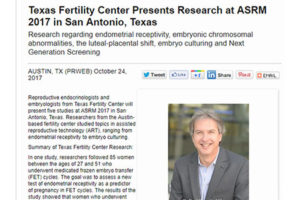Research regarding endometrial receptivity, embryonic chromosomal abnormalities, the luteal-placental shift, embryo culturing and Next Generation Screening
 AUSTIN, TX (October 24, 2017) – Reproductive endocrinologists and embryologists from Texas Fertility Center will present five studies at ASRM 2017 in San Antonio, Texas. Researchers from the Austin-based fertility center studied topics in assisted reproductive technology (ART), ranging from endometrial receptivity to embryo culturing.
AUSTIN, TX (October 24, 2017) – Reproductive endocrinologists and embryologists from Texas Fertility Center will present five studies at ASRM 2017 in San Antonio, Texas. Researchers from the Austin-based fertility center studied topics in assisted reproductive technology (ART), ranging from endometrial receptivity to embryo culturing.
Summary of Texas Fertility Center research
In one study, researchers followed 85 women between the ages of 27 and 51 who underwent medicated frozen embryo transfer (FET) cycles. The goal was to assess a new test of endometrial receptivity as a predictor of pregnancy in FET cycles. The results of the study showed that women who underwent this test were significantly more likely to have a receptive endometrium, according to ERA testing, on the seventh day of progesterone – rather than on the sixth day as previously thought. Additionally, women who underwent a transfer on the seventh day of progesterone in medicated FET cycles had higher pregnancy rates.
In another study, Texas Fertility Center and Ovation Fertility Austin examined 3,370 blastocysts that were identified as morphologically suitable for fresh embryo transfer, freezing or biopsy for genetic testing. The goal of the study was to determine the number of chromosomes in usable embryos derived from eggs that did not display two pronuclei (2PN) at the time of fertilization assessment. Researchers discovered that usable embryos derived from eggs with abnormal pronuclear formation can become chromosomally normal embryos, although there is still a high possibility that these embryos will have chromosomal abnormalities.
In a study of 262 women who conceived after a frozen embryo transfer, researchers sought to determine the timing of the luteal-placental shift, ie. the time at which the placenta takes over hormone production during pregnancy. After assessing the hormone levels of these patients, researchers determined that the luteal-placental shift begins to occur at approximately seven weeks’ gestation. As a result, women should continue to receive estradiol replacement until at least that time – and progesterone replacement until eight to nine weeks’ gestation.
A study that examined embryo culture analyzed nearly 700 frozen embryo transfer cycles to determine whether culturing embryos to Day 7 improves IVF cycle outcomes. Culturing embryos to Day 7 appears to be a beneficial practice that results in more viable pregnancies.
The final study for presentation at ASRM reviewed the initial results of Next Generation Screening for preimplantation genetic screening (PGS) of embryos. After assessing embryo chromosomal competency and pregnancy success from one IVF laboratory, the findings revealed that Next Generation Screening identified embryos that were more likely to implant and produce a live birth than embryos selected by their morphology (microscopic appearance) alone.
Research influences fertility protocols and patient care
According to Kaylen Silverberg, M.D., the medical director of Texas Fertility Center, “Texas Fertility Center has always had two goals. The first is to provide exceptional fertility care to men and women who need assistance with family building. The second is to advance the field of reproductive medicine through our research efforts.”
Dr. Silverberg went on to offer his thoughts on the importance of sharing research findings from his Austin, Round Rock, and San Antonio fertility centers. “Patients of our Austin fertility center shouldn’t be the only ones who benefit from Texas Fertility Center experience and innovation. We believe it is important that our physicians and embryologists share our findings with other specialists from around the world. We have been doing this for over 30 years, and our findings have changed the way that IVF is practiced,” he said.














Comments are closed.